The Economics of The Office
Learning economics from the world's best boss
Textbook Tear
In this silly clip, we see Michael's disdain for economics and traditional learning. Michael abuses the trust of a student in ruining a textbook that clearly has value to the student.
Season 3 Episode 16 "Business School"
Teaching of Economics (A20)

Candy Bars
In this clip, we see that Michael doesn’t really understand very much about business or economics but he does have a clever way of explaining his limited knowledge through the use of candy bars!
Season 3 Episode 16 "Business School"
Teaching of Economics (A20)

Write That Down
In this clip, Michael tries to explain the concept of profits and business decisions and the demand for paper. Clearly, Michael does not understand how technological changes have influenced demand for paper!
Season 3 Episode 16 "Business School"
Teaching of Economics (A20) Technological Change (O30)


Pretzel Day 1
Even when something comes at a zero monetary cost it may cost considerable time to get something for “free”. How much money would you spend for a pretzel? What is the value of the time that Michael and Stanley are spending standing in line? Is a pretzel really worth that much?
Season 3 Episode 5 "Initiation"
Labor Productivity (J24) Behavioral Economics (D03)

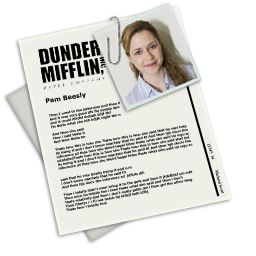
Pretzel Day 2
Even when something comes at a zero monetary cost it may cost considerable time to get something for “free”. How much money would you spend for a pretzel? What is the value of the time that Michael and Stanley are spending standing in line? Is a pretzel really worth that much?
Season 3 Episode 5 "Initiation"
Externalities (D62) Behavioral Economics (D03)

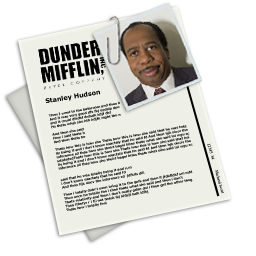
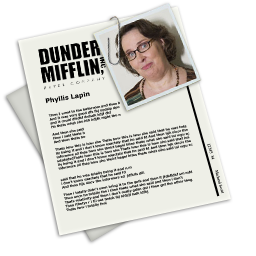

Pretzel Day 3
Even when something comes at a zero monetary cost it may cost considerable time to get something for “free”. How much money would you spend for a pretzel? What is the value of the time that Michael and Stanley are spending standing in line? Is a pretzel really worth that much?
Season 3 Episode 5 "Initiation"
Labor Productivity (J24) Behavioral Economics (D03)


Huge Turnaround for Profit
Dwight corners the market on Princess Unicorn dolls! This is a good opportunity to discuss the relationship between expected future prices and changes in demand. Dwight knew that the demand for these dolls would increase as Christmas drew closer. Advanced students should be able to draw a supply and demand graph for this market and see that in the very short run the supply of this good is perfectly inelastic in the Scranton area. This makes the profit opportunity for Dwight even greater.
Season 5 Episode 11 "Moroccan Christmas"
Information and Market Efficiency (G14) Microeconomic Behavior: Underlying Principles (D01)
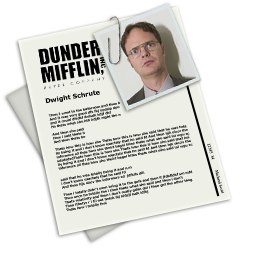
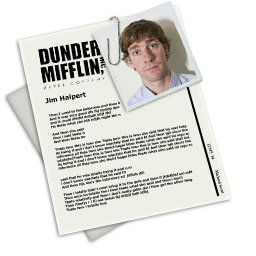
FaLaLa CaChing
Dwight corners the market on Princess Unicorn dolls! This is a good opportunity to discuss the relationship between expected future prices and changes in demand. Dwight knew that the demand for these dolls would increase as Christmas drew closer. Advanced students should be able to draw a supply and demand graph for this market and see that in the very short run the supply of this good is perfectly inelastic in the Scranton area. This makes the profit opportunity for Dwight even greater.
Season 5 Episode 11 "Moroccan Christmas"
Information and Market Efficiency (G14) Microeconomic Behavior: Underlying Principles (D01)

Arbitrage
In this example Dwight exploits an arbitrage opportunity. He buys a good at a low price and then sells it at a much higher price. We think in efficient markets consumers or firms will look to exploit these opportunities until they no longer exist.
Season 4 Episode 16 "Did I Stutter?"
Information and Market Efficiency (G14) Microeconomic Behavior: Underlying Principles (D01)


Performance Review
In this clip (found only on the deleted scenes sadly), Dwight attempts to justify the raise he feels he deserves. Dwight correctly identifies the relationship between inflation and his real wage. If Dwight’s nominal wages do not increase at least at the rate of inflation the real purchasing power of his wages will fall!
Season 2 Episode 8 "Performance Review"
Compensation Packages (J33) Inflation (E31)



Schrute Bucks
In this clip Dwight attempts to use the motivational tool of Schrute Bucks to keep his employees motivated. The problem is even though his “money” is somewhat similar to a dollar in that it has no intrinsic value it also does not have any real buying power. It is not accepted as a good unit of account or a good store of value. This is a good opportunity to talk about the functions of money with a class.
Season 3 Episode 24 "The Job"
Monetary Systems (E42)




Schrute Bucks Counterfeits
In this scene Creed threatens to devalue Dwight’s currency. This has occurred in Zimbabwe recently and in Germany after World War I just to cite a couple of famous examples.
Season 3 Episode 24 "The Job"
Monetary Systems (E42) Money Supply (E51)
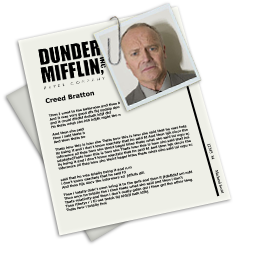


Broke
Using this clip as a starting point, we can demonstrate and discuss the difference between fixed costs and variable costs.
Season 5 Episode 25 "Broke"
Production and Cost (D24)



Dunder Mifflin Infinity
In this clip (from deleted scenes) we can demonstrate a good example of structural unemployment. Due to an advance in technology the skills of the Dunder Mifflin accountants will no longer be needed. Obviously from here students may want to discuss cyclical and frictional unemployment (which can be demonstrated when Michael foolishly quits his job with no real plan for his job search in season five).
Season 4 Episode 3 "Dunder Mifflin Infinity"
Unemployment (J60) Technological Change (O33)




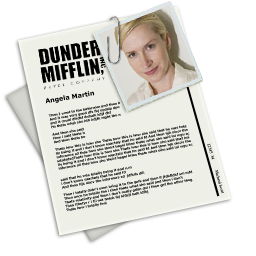

Babysitter
In this clip, Jim and Pam discuss how difficult it is to find a good babysitter for their kids. They are only willing to hire a babysitter with highly specialized skills. Therefore, they should be expected to pay a premium price for a sitter. It's not that there is a shortage of available babysitters as much as there is a shortage of sitter who have demonstrated the skill set they think is required..
Season 4 Episode 3 "Andy's Play"
Information and Market Efficiency (G14) Microeconomic Behavior: Underlying Principles (D01)


Flowers
In this clip, Michael tries to buy flowers only to discover how expensive they are. This is a good example of the relationship between price elasticity of demand and the availability of substitute goods. Also we see that when the price of a good is above someone's reservation price, they will either go without the good or purchase a substitute good.
Season 4 Episode 3 "Andy's Play"
Microeconomic Behavior: Underlying Principles (D01) Market Structure and Pricing (D40)



Jacket
Kevin buys a jacket. Students should be able to demonstrate that putting Kevin's name on the jacket shifted his demand curve for this good to the right.
Season 4 Episode 3 "Andy's Play"
Microeconomic Behavior: Underlying Principles (D01)


Landlord Dwight
When Dwight becomes the office's landlord he sets up a coffee shop in the foyer and installs motion sensors on the lights. Dwight is able to charge high prices in the coffee shop because its location gives him monopoly power. His efforts to cut costs are an example of incentives at work.
Season 7 Episode 10 "China"
Production and Cost (D24) Microeconomic Behavior: Underlying Principles (D01) Monopoly (D42)


Conflict Resolution Part 1
In this clip, Michael attempts to resolve a conflict between Oscar and Angela. One application of this clip is to reiterate the idea that voluntary trade results in a "win win" situation. This clip also can be used when showing outcomes on an aggregate supply/aggregate demand framework. When we have a major increase in aggregate supply (something like the IT revolution in the 1990's) it results in lower levels of inflation and unemployment or a "win win" outcome. (maybe even win, win, win!)
Season 2 Episode 21 "Conflict Resolution"
Trade (F10) Macroeconomic Models (E10) Unemployment (J60) Inflation (E31)



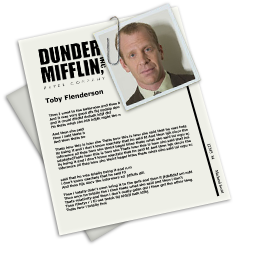

Conflict Resolution Part 2
Similar to the applications in Part 1, the "win lose" outcome in this clip can be used to talk about the expected trade off between inflation and unemployment when many polices are implemented.
Season 2 Episode 21 "Conflict Resolution"
Macroeconomic Policy (E60) Unemployment (J60) Inflation (E31)


Commission Skit
Michael and Dwight dress up in costume and act out a skit to try to convince the office to reject a corporate policy change in commissions. Michael inadvertently makes the case that the new policy can only make them better off. This is an example of evaluating decisions at the margin.
Season 7 Episode 6 "Costume Contest"
Microeconomic Behavior: Underlying Principles (D01)



Pyramid Scheme
Michael tries to convince the office to sell calling cards until he realizes it is a pyramid scheme. Occasionally, students will be offered "internships" that are thinly disguised ponzi schemes. This clip can be used as a lead in to talk about "mufti level marketing schemes" where the product being offered is not very valuable.
Season 2 Episode 19 "Michael's Birthday"
Consumer Protection (D18) Corporate Finance and Governance (G30)





Nepotism
Michael hires his nephew, Luke, to work at the office and is forced to defend his decision to the rest of the employees.
Season 2 Episode 19 "Nepotism"
Labor Demand (J23) Labor Discrimination (J71)






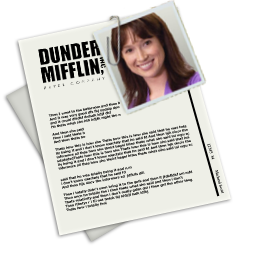
Search Committee Part 1
The office puts together a search committee to hire a new boss. One candidate (played by Warren Buffet), negotiates for a higher wage and then asks about job perks. A good example of bargaining and the principal-agent problem that arises in the workplace.
Season 7 Episode 24 "Search Committee"
Wage Level and Structure (J31) Compensation Packages (J33)

Search Committee Part 2
Jo Bennett comes to Scranton and Kelly takes the opportunity to report Gabe's disturbing behavior. Meanwhile, Dwight vies for the job of office manager. The key to this clip is Dwight's lack of knowledge that each text he sends is imposing an additional cost on Jo.
Season 7 Episode 24 "Search Committee"
Job Vacancies (J63) Labor Discrimination (J71) Microeconomic Behavior: Underlying Principles (D01)


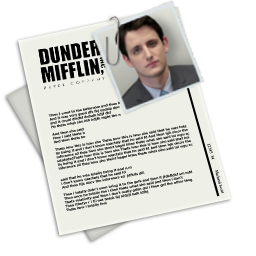
Commission Cap Part 1
Jim loses his incentive to work when corporate institutes a cap on commissions.
Season 7 Episode 9 "WUPHF.com "
Wage Level and Structure (J31) Compensation Packages (J33) Microeconomic Behavior: Underlying Principles (D01)




Commission Cap Part 2
After Jim loses his incentive to sell, he looks for other ways to fill his time. A good example of incentives.
Season 7 Episode 9 "WUPHF.com "
Wage Level and Structure (J31) Compensation Packages (J33) Microeconomic Behavior: Underlying Principles (D01)


Commission Cap Part 3
After Jim loses his incentive to sell, he starts bothering his colleagues looking for ways to kill time.
Season 7 Episode 9 "WUPHF.com "
Wage Level and Structure (J31) Compensation Packages (J33) Microeconomic Behavior: Underlying Principles (D01)

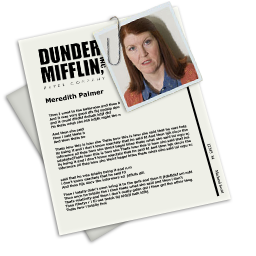


Commission Cap Part 4
After Jim loses his incentive to sell, he pranks Gabe.
Season 7 Episode 9 "WUPHF.com "
Wage Level and Structure (J31) Compensation Packages (J33) Microeconomic Behavior: Underlying Principles (D01)


Garage Sale
The office holds a garage sale to get rid of things they no longer need. Meanwhile, Dwight starts with a thumbtack and trades his way up to a telescope. However, he soon parts with the telescope when Jim offers him something of seemingly even more value. This is a great example of how consumer preferences differ and how trade can make two parties better off. It also illustrates how effective marketing can shift an individual's demand curve to the right.
Season 7 Episode 19 "Garage Sale"
Trade (F10) Microeconomic Behavior: Underlying Principles (D01)








The Incentive
When Andy becomes the new manager, he institutes a 'points system' to incentivize the office to sell more paper. His plan works better than expected when he offers to tattoo himself as the grand prize. This clip is a funny example of the power of incentives.
Season 8 Episode 2 "The Incentive"
Microeconomic Behavior: Underlying Principles (D01) Labor Productivity (J24) Compensation Packages (J33)






Yankee Swap
The office celebrates Christmas with a Secret Santa gift exchange. When Michael doesn't like the gift he receives, he turns the gift exchange into a gift swap where the employees can steal gifts from one another. This is great starting point to discuss the welfare effects of giving gifts and the heterogeneity of consumer preferences.
Season 6 Episode 13 "Secret Santa"
Microeconomic Behavior: Underlying Principles (D01)














The Proposal
Jim pays for fireworks at Toby's farewell party so that he can propose to Pam. Doing so creates a positive externality for everyone at the party. Fireworks are a common example of a public good, because they are both non-rival and non-excludable. This makes it easy for individuals to free ride, utilizing the public good without contributing to its production. Jim learns this first hand when Andy makes the most of the romantic atmosphere.
Season 4 Episode 19 "Goodbye, Toby"
Microeconomic Behavior: Underlying Principles (D01) Externalities (D62)






The Surplus
It's the last day of the fiscal year at Dunder Mifflin and Michael must spend the last $4300 in his budget or lose it for all subsequent years. This clip illustrates the unintended consequences of perverse incentives.
Season 5 Episode 10 "The Surplus"
Microeconomic Behavior: Underlying Principles (D01)

